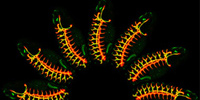Research :: The Big Picture
Tubular epithelia are the fundamental units of organs such as the vascular system, kidney and lung, and the sizes (diameters and lengths) of these tubes are critical for organ function. Tubes that are too small can have insufficient flow (e.g. ischemia) while tubes that are too large can impinge on other tissues (e.g. polycystic kidney disease) or have undesirable flow characteristics (e.g. blood pooling and clot formation in cavernous hemagiomas). Although millions of people worldwide suffer and die from diseases which result from tube-size abnormalities, virtually nothing is known about how epithelial tube size is controlled.
To understand the cell biological and molecular mechanisms of tube-size regulation, we are using genetic approaches to identify genes that regulate tube-size control in the Drosophila tracheal system. We then investigate the functions of proteins encoded by these genes using molecular, cell biological, biochemical and genetic approaches.


